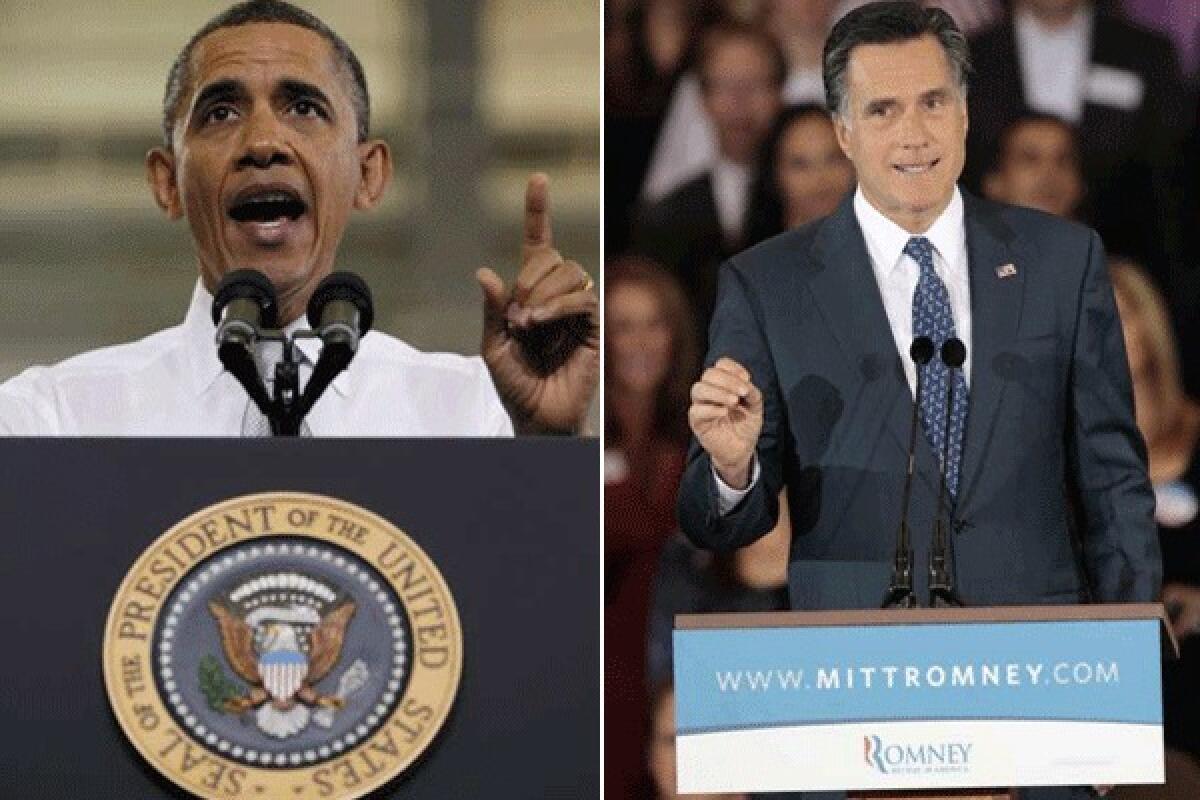McManus: Romney won’t be a pushover in November

- Share via
Mitt Romney started as the odds-on favorite for the GOP nomination, and he’s never really lost that spot. Still, he’s had a rough six weeks.
He’s been attacked by his Republican rivals as both a heartless capitalist and a closet liberal. He’s committed gaffes that make him sound like a caricature of a clueless rich guy. And the Democratic president he wants to replace has surged ahead of him (and all the other GOP challengers) in head-to-head polls.
So is it time for Democrats to rejoice? Far from it.
COMMENTARY AND ANALYSIS: Presidential Election 2012
The words of caution that President Obama’s top strategists, David Plouffe and David Axelrod, repeat to their staff each week still hold: “This is going to be a close election.”
The fratricidal primary campaign, which John McCain described as “like watching a Greek tragedy,” isn’t going to last forever. At some point, perhaps as early as next week’s Super Tuesday, Romney is likely to gain an insuperable advantage and the Republican nomination will be his.
Once Romney becomes the candidate, most Republicans will rally behind him and he can start focusing on the more moderate voters he will need to win the election. At that point, he’s likely to become a much greater threat to Obama.
The primary campaign, in which Romney has had to play a desperate game of whack-a-mole to eliminate surging rivals running to his right, distracted him from delivering his primary message: that he’s a private sector manager who can fix the government and get the economy moving again. That’s an approach that should still appeal to independent voters in a general election.
Romney, as a relative moderate in the GOP field, has always appeared better suited for a general campaign than for the primary race, where candidates have to appeal to the party faithful. But he still needs to refine his pitch. He started with a 59-point plan that impressed pundits with its seriousness, but it was 50 points more than most voters wanted to read. He tried to unveil a new, slimmer version of the plan last week, but the news was mostly about how his campaign couldn’t fill the seats in the football stadium where he inexplicably delivered his speech.
So he tried again on Tuesday night in his victory speech in Michigan. “I’m going to deliver more jobs, less debt and smaller government,” he said. And then, for good measure, said it again, suggesting that we will be hearing that phrase often in the months to come. It’s not specific, and it doesn’t explain how Romney would deliver the goods. (Romney’s plan for tax cuts, in particular, makes it harder to reduce the national debt, not easier.) But at least it keeps his message focused where he wants it.
One key thing Romney will have going for him is the sputtering state of the economy. The stock market is up, and so is consumer confidence, but those are less important to most voters than the unemployment rate or the price of gasoline, and both of those are likely to remain stubbornly high for the rest of the year. Like every GOP candidate, Romney has condemned Obama for withholding approval of the Keystone XL pipeline, which would carry oil from Canada to Texas, an issue that has allowed Republicans to resurrect their favorite epithet: “job killer.”
The best news for Republicans is old news: Obama’s standing among voters is still shaky. The percentage of voters who say they approve of the way the president is doing his job has increased to almost 49% (to use the average of polls compiled by the RealClearPolitics website), but that’s still below a level that would guarantee reelection. (Pollsters say a president running for a second term normally wins the same share of the vote as his job approval rating, plus about 1 percentage point — suggesting that, if the election were held today, it would be almost a dead heat.)
Yes, there are “head-to-head” polls that show Obama beating Romney and other Republicans, but those don’t matter at this still early stage of the campaign. To use the more precise language of pollsters, they have “low predictive power.”
One more poll number that’s important: the percentage of Americans who think the country is heading in the wrong direction. Those numbers are still markedly high — about 59% on average — despite the recent signs of economic recovery. That’s bad news for any president who’s seeking reelection; it means there’s an opportunity for a challenger to make a case that he can do better.
More than eight months remain before election day, enough time for any candidate to regain his footing, no matter how difficult his passage through the primaries has been.
It’s still likely to be a close election.
More to Read
Get the L.A. Times Politics newsletter
Deeply reported insights into legislation, politics and policy from Sacramento, Washington and beyond. In your inbox twice per week.
You may occasionally receive promotional content from the Los Angeles Times.











